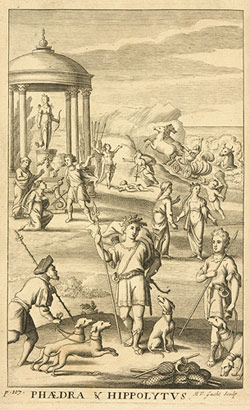The Story of Hippolytos and Phaidra
Hippolytos was the illegitimate son of King Theseus of Athens. Fervently religious, he was devoted to Artemis, the virgin goddess of the hunt. Provoked by jealousy, Aphrodite, the goddess of love, drove Hippolytos's stepmother Phaidra to fall desperately in love with him. Phaidra grew sick, consumed by forbidden passion. Hoping to cure her, Phaidra's nurse told Hippolytos about Phaidra's plight, but swore him to secrecy. Hippolytos rejected Phaidra and she committed suicide. To salvage her reputation, however, the queen left Theseus a note accusing Hippolytos of having raped her. Bound by his oath of secrecy, Hippolytos was unable to defend himself. Theseus banished Hippolytos and called upon Poseidon, god of the sea, to curse him. As the youth drove along the shore into exile, a monstrous bull sent by Poseidon rose from the waves, terrifying his horses. Hippolytos was thrown from his chariot and dragged to his death.
A Visual Recounting of the Myth Hippolytos stands in the center foreground, surrounded by his hunting companions and dogs. In the middle ground, at right, Phaidra tells the nurse of her love, symbolized by the winged cupid with a burning torch fluttering behind her (see detail). At left, Hippolytos, holding his sword, rejects the entreaties of Phaidra and her nurse. Behind them is a flaming altar and the circular temple of Hippolytos's patron, Artemis, virgin goddess of the hunt (see detail). At far right, a bull rises from the sea, startling Hippolytos's horses and causing him to lose control of his chariot (see detail). To the right of the temple, Theseus and his men return home to find Phaidra committing suicide; Hippolytos lies lifeless at her feet (see detail). |
